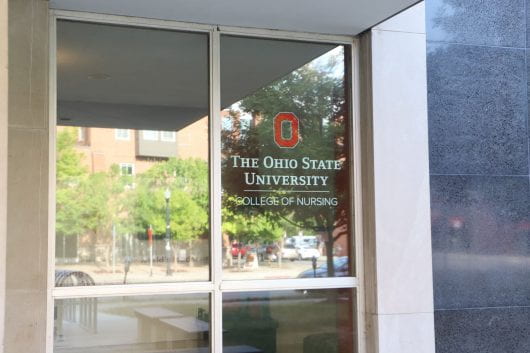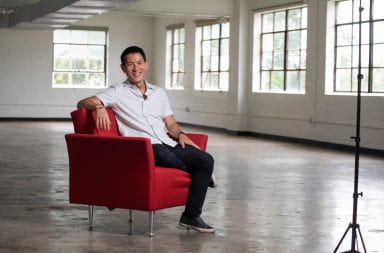
Ohio Legislature has given future nurses the opportunity to work without taking their licensing examinations. Credit: Amal Saeed | Photo Editor
In an effort to lessen the impact of COVID-19 on hospitals’ resources, the Ohio legislature has given future nurses the opportunity to work without taking their licensing examinations — including Ohio State nursing graduates.
Gov. Mike DeWine signed amended House Bill 197 Friday, a tax bill aimed at relieving Ohioans from economic, academic and other burdens posed by COVID-19. In addition to extending deadlines for filing taxes, pushing back absentee voting and waiving state exams for K-12 students, the bill allows nursing school graduates to apply for temporary licenses to practice without first passing a licensing exam.
“As a board certified family physician with nearly three decades of practice experience, you can rest assured that the health and safety of my constituents is of paramount importance to me,” State Sen. Terry Johnson, R-McDermott, co-sponsor of the bill, said in a press release Wednesday.
Under the bill, which unanimously passed in the Senate Wednesday, graduates will be able to apply for a provisional license to practice as a registered nurse or licensed practical nurse until either 90 days after Dec. 1 or 90 days after the end of the state of emergency, as declared by DeWine March 9 — whichever date comes first.
Bernadette Melnyk, dean of the Ohio State College of Nursing and chief wellness officer of the university, said she believes granting nursing graduates provisional licenses is appropriate during the pandemic.
“We need everybody who’s been well educated and skilled out there in the workforce as fast as we can get them right now,” Melnyk said.
The college has 1,002 undergraduate students, according to the spring 2019 15th-day enrollment report. Melnyk said about 160 students graduate each year with a Bachelor of Science in nursing, the degree from the college that would allow students a license to practice.
HB 197 is part of a larger effort by the state to control the COVID-19 outbreak. In the initial stages of the pandemic, DeWine issued orders to prevent the virus’s spread: Bars and dine-in restaurants were closed March 15; gyms and indoor recreational facilities were closed March 16; hospitals, dentists and veterinarians were ordered to postpone nonessential surgeries March 17; and a stay-at-home order was put in place March 23.
At a press conference Friday, DeWine said the stage of containment had ended and the state’s focus will be on supplying hospitals with proper equipment and staff in preparation of a “surge” of COVID-19 cases.
“Within about two weeks, it’s going to kick in much harder. We’re really going to start getting hit very hard in our hospitals and our hospital admissions,” DeWine said.
In addition to reserving ventilators and personal protective equipment such as surgical masks, goggles and gloves for hospitals, DeWine said it is important to keep as many ICU beds available as possible.
At the time of publication, there were 1,933 confirmed cases in Ohio, with 475 hospitalizations and 39 deaths, according to the Ohio Department of Health website. Of the hospitalizations, 163 are intensive care unit admissions.
Dr. Amy Acton, director of the Ohio Department of Health, said in a press conference March 24 that Ohio has roughly 3,600 ICU beds. In Friday’s press conference, Acton said keeping hospital beds open is vital to handling the virus, which has a 9-11 percent ICU admission rate in Ohio.
Acton said March 24 that hospital ICU bed capacity was at 60 percent after stopping elective surgeries and that ICU capacity needs to be expanded by 50 percent, most likely by moving routine care patients to “lesser care settings.”
“There’s a lot of morbidity with this disease. And people who are getting it, while most of us are riding it out at home, any one of us, we don’t know how our body might react to it and that’s why it’s so important that we have the hospital capability for you if your condition worsens,” Acton said.
Melynk said she is confident in the ability of Ohio State’s nursing school graduates to be on the frontlines of the pandemic in the state’s hospitals.
“We produce outstanding graduates,” she said. “My graduates can take care of me and my family any day. That’s how confident I feel.”


